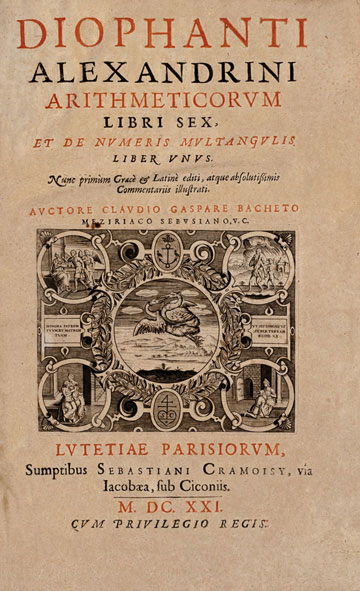Diophantus of Alexandria (AD c. 200–c. 284)

Title page of the 1621 edition of Diophantus' Arithmetica, translated into Latin by Claude Gaspard Bachet de Méziriac.
Diophantus was one of the last great Greek mathematicians; he developed his own algebraic notation and is sometimes called "the father of algebra." His works were preserved by the Arabs and translated into Latin in the sixteenths century, when they served to inspire momentous new advances.
The titles of three of his works are Arithmetics, Polygonal Numbers, and Porisms. Of the first, which consisted of 13 books, only six have survived; of the second, we have just a fragment; and the third has been entirely lost. The Arithmetics is the earliest extant treatise on algebra, but it would be rash to say that Diophantus was the inventor of algebra, though to what extent he was indebted to his predecessors cannot now be decided. The first book of Arithmetics is concerned with problems leading to determinate equations of the first degree, the rest of the books with problems leading to indeterminate equations of the second degree, the sixth book in particular being devoted to the finding of right-angled triangles where some linear or quadratic function of the sides is to be a square or cube.
The treatise on Polygonal Numbers not analytical but synthetical – i.e. in the manner of Euclid's arithmetical books – and in it numbers are represented by lines. The Porisma were probably a collection of propositions on the properties of certain numbers.
The first translation of Diophantus was into Latin by Xylander (Wilhelm Holzmann) in 1575. The only edition of the Greek text is that of Bachet, published along with a Latin translation in 1621, and reprinted with the addition of Fermat's notes and many misprints in 1670. A translation into German by Otto Schulz appeared in 1822.
Diophantine equations are named in his honor. It was in the margin of a French translation of Diophantus' work Aritmetike from c. 250 that Pierre de Fermat scribbled his famous comment that became known as Fermat's last theorem.


